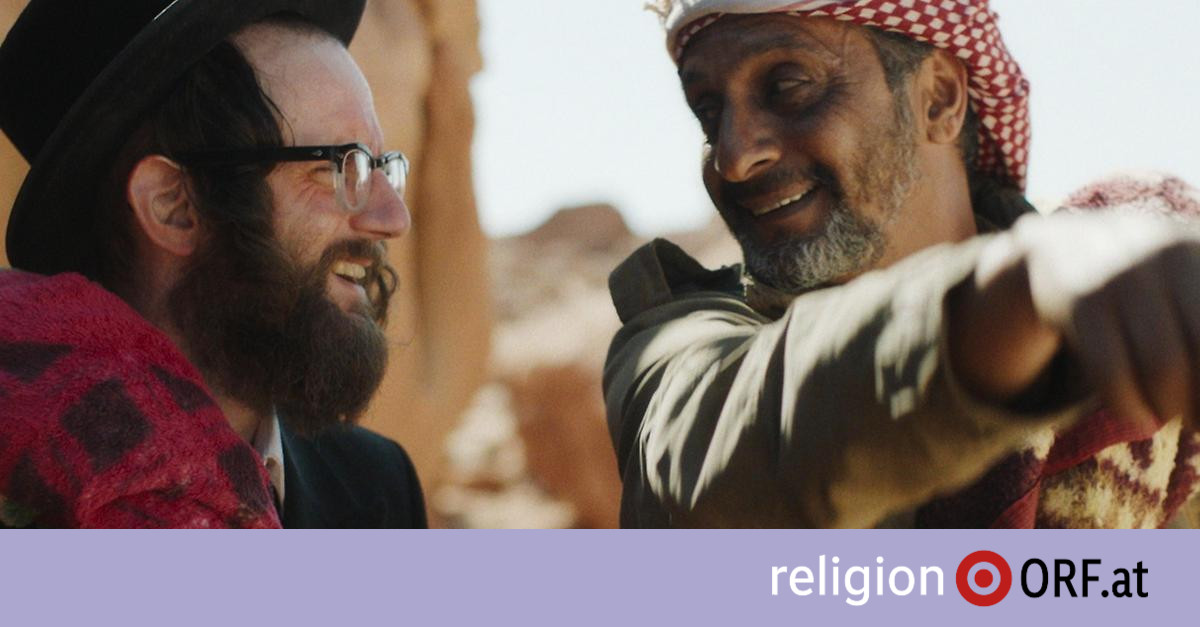Ben (Luzer Twersky), an ultra-orthodox Jew from Brooklyn, offers to fly to Alexandria to avoid his family’s matchmaking attempts. Because what was once the largest Jewish community in the world has shrunk. Now she is missing the tenth man to celebrate the upcoming Passover festival. To make matters worse, the community also runs the risk of losing the right to their property. Ben seems to be the rescue. But he misses the flight.
The overland journey turns out to be difficult, because the reservations against orthodox Jews are great: Ben is thrown out of the bus. As a hitchhiker, he meets the Bedouin nobility (Haitham Omari). He promises to take him with him, but first he has to solve his own problems. Her path leads her deep into the desert and to the question of how religious and cultural differences can be overcome. Not Quite Kosher is a clever film that tackles big questions with a refreshing lightness, without becoming banal or giving hasty answers.
Inspiration in the Sinai desert
Stefan Sarazin had his first inspiration for the film almost 20 years ago. He met Bedouins in the Sinai desert. “This taciturnity and also this straightforwardness that the Bedouins sometimes have, also the lack of transparency” fascinated him. He became friends with one of them, Adel. The idea for the film came up, but initially remained vague: in the center a Bedouin who is fighting for his land and his identity, on the other side western capitalists and an unworldly American Jew who has inherited a valuable piece of land in Sinai.
The film only really took shape a few years later, Sarazin says: A friend, Freyja Weinert, with whom he had often discussed the story, had the decisive idea when she said: “Why doesn’t your Jew go as the tenth man through the desert to Alexandria? Like the Exodus just in the other direction?”. The idea of religious and cultural poles that developed from this also convinced Peter Keller: “I found it appealing to tell a universal story with it.”
The idea for the buddy road movie with a religious background was born. As Keller and Sarazin tell religion.ORF.at, they wrote the screenplay in exactly 40 days in the Sinai desert. As Keller explains, they also want to show with the film that “the problems between people that we have on our planet are actually not possible in the form when you meet as people and respect each other as people and openly and approach each other with an open heart and without suspicion.”
Screenplay awarded LOLA
Sarazin and Keller received the LOLA for the German Screenplay Award in 2011 for the screenplay entitled “No Name Restaurant”. The jury justified their choice with the fact that it was not only intelligently written, but “in a very entertaining and imaginative way combines philosophizing about the basics of being human with a tangible adventure and a lot of situation comedy”.
The success of the two is certainly also due to the thorough research and numerous trips that preceded the project. They took Sarazin and Keller to the Middle East, to Jerusalem and finally to New York to gain insights into the life of the ultra-Orthodox Jewish communities for the film. The film itself was shot in 34 days and two shooting periods. The first recordings took place in Haifa in 2017, the main part was filmed in 2019 in Palestine, Jerusalem and Jordan.

–
“Caught up by daily politics”
The work was done with local teams, except for key positions such as camera, sound, make-up, costume and set design, who came from Germany. Luzer Twersky, who embodies Ben, comes from a Hasidic community in Brooklyn, from which he had to break out in order to become an actor. Haitham Omari (Adel) is a Muslim Palestinian from East Jerusalem. The other actors and actresses also come, as Sarazin explains, “from precisely these exciting real-political situations”, which the film also addresses.
Keller remembers that day-to-day politics kept catching up with her while she was shooting. It turned out that the biggest problems were not interpersonal, but political. It sometimes took a lot of persuasion to get the whole team through the checkpoints, with their different passports, says Sarazin.
A film that makes you think
In many places, “not quite kosher” does not require big words. “It’s a laconic style of storytelling that gives the film its charm and subtle humor,” says Keller. They found inspiration during their travels in the desert. Sarazin: “The desert often leaves you speechless. So the desert is not for chatterboxes. In the desert one soon becomes mute. It’s too hot there, it’s too empty there, it’s too quiet there.”

The fact that the two main actors often say little to each other in the film, only carefully eyeing each other, stimulates thought. The same applies to the question of women. Because they are always strongly present, not least because of the love stories, without being much in the picture. One reason for this is also the patriarchal structures of the three monotheistic religions, which are not specifically discussed, but are certainly reminiscent.
“Not quite kosher” gives exciting insights into major issues of Jewish-Orthodox communities, the Bedouins and the political situation in Alexandria. The fairytale approach to this creates a lightness that makes you want more.
–

